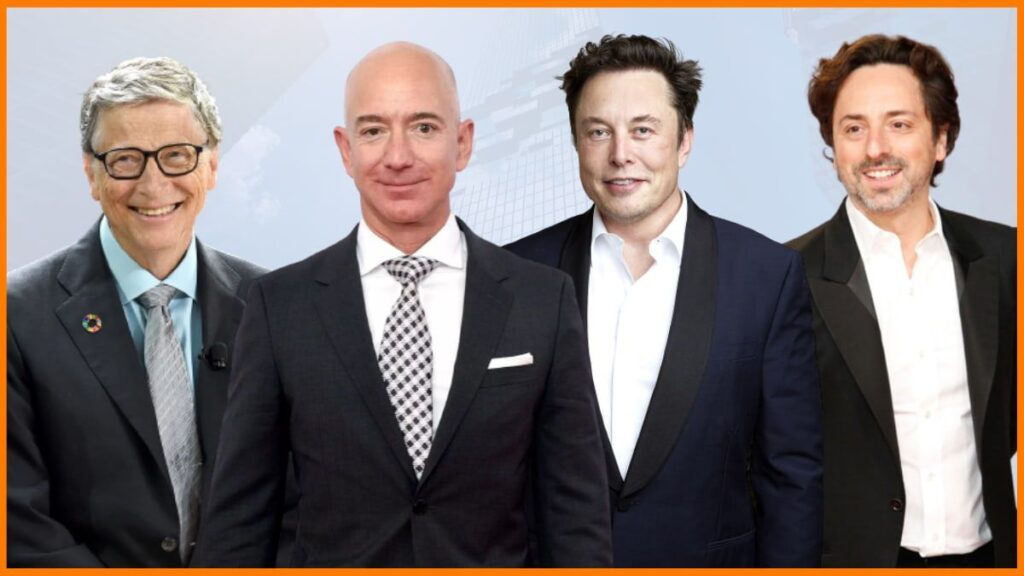Success in the business world often seems elusive, a goal that only a select few manage to achieve. However, when we delve into the stories of the world’s top entrepreneurs, we find that their paths are not defined by luck but by a series of deliberate decisions, failures, and eventual triumphs. These entrepreneurs have left behind valuable lessons that aspiring business leaders can learn from. This article explores the essential lessons from some of the most successful entrepreneurs in the world, including how they built their empires, overcame challenges, and ultimately redefined industries.
The Power of Vision: Steve Jobs and the Art of Seeing the Future
Steve Jobs, the co-founder of Apple Inc., is often celebrated as a visionary who could foresee the future of technology. His success wasn’t just due to his technical acumen but rather his ability to imagine what technology could become. Jobs didn’t just create products; he created experiences. The lesson here is the importance of having a clear, compelling vision. A vision that isn’t just about making money, but about creating something that can change the world.
Jobs believed in the power of simplicity and user-friendly design. When Apple was on the brink of bankruptcy, it was Jobs’ return and his laser-focused vision on a few core products that brought the company back to life. The iPod, iPhone, and iPad weren’t just successful because they were innovative; they succeeded because they were the realization of Jobs’ vision of seamless, integrated technology that enriched people’s lives. Entrepreneurs can learn from Jobs that a strong, well-communicated vision can be a powerful tool in rallying teams, attracting customers, and driving innovation.
Resilience in the Face of Failure: The Story of Elon Musk
Elon Musk, the founder of SpaceX, Tesla, and several other ventures, is no stranger to failure. What sets Musk apart is his resilience and his ability to keep pushing forward despite numerous setbacks. Musk’s journey is a testament to the fact that failure is often a prerequisite for success. He has faced financial difficulties, technical challenges, and public skepticism, yet he continues to strive toward his goals.
Musk’s story teaches entrepreneurs that failure should not be feared but embraced as a part of the process. His persistence in the face of adversity has led to groundbreaking advancements in space exploration and electric vehicles. SpaceX, for instance, had multiple failed launches before achieving its first successful mission. Instead of giving up, Musk used each failure as a learning opportunity, ultimately leading SpaceX to become the first private company to send astronauts to the International Space Station.
The lesson here is clear: resilience is key to overcoming obstacles. Entrepreneurs must be prepared to face setbacks, learn from them, and continue moving forward with determination. Failure is not the end, but a stepping stone on the path to success.
Innovation and Adaptability: Jeff Bezos and the Evolution of Amazon
Jeff Bezos, the founder of Amazon, started the company as an online bookstore in 1994. Today, Amazon is a global e-commerce giant, thanks in large part to Bezos’ commitment to innovation and adaptability. Bezos understood early on that the internet would revolutionize commerce, and he positioned Amazon to take full advantage of this shift. However, Bezos didn’t stop at books. He continually expanded Amazon’s offerings, from electronics to groceries to cloud computing services.
Bezos’ ability to anticipate market trends and adapt to changing consumer needs has been crucial to Amazon’s success. One of the key lessons from Bezos’ story is the importance of staying ahead of the curve. In business, those who can innovate and adapt quickly to changes in the market are often the ones who succeed.
Another critical aspect of Bezos’ success is his customer-centric approach. Amazon’s commitment to providing an exceptional customer experience has been a driving force behind its growth. From offering fast delivery options to creating a user-friendly shopping platform, Bezos has always prioritized the needs of the customer. This focus on customer satisfaction has helped Amazon build a loyal customer base and become one of the most trusted brands in the world.
Entrepreneurs can learn from Bezos that success often requires the ability to innovate continuously and adapt to new challenges. By staying flexible and keeping the customer at the center of their business strategy, entrepreneurs can build companies that stand the test of time.
The Value of Passion and Purpose: Oprah Winfrey’s Journey to Media Mogul
Oprah Winfrey’s rise to becoming a media mogul is a story of passion, purpose, and perseverance. Born into poverty, Winfrey overcame numerous obstacles to become one of the most influential figures in the entertainment industry. Her success can be attributed to her unwavering passion for storytelling and her commitment to using her platform to inspire and empower others.
Winfrey’s story underscores the importance of finding and pursuing one’s passion. Her success wasn’t driven by a desire for fame or wealth but by a genuine love for what she did. This passion translated into an authentic connection with her audience, which became the foundation of her success.
Furthermore, Winfrey’s journey highlights the importance of purpose. She didn’t just build a media empire; she created a platform that gave a voice to the voiceless and tackled important social issues. Entrepreneurs can learn from Winfrey that success is often more sustainable and fulfilling when it is rooted in passion and purpose. When you love what you do and have a clear sense of purpose, it becomes easier to navigate challenges and stay motivated.
Building a Strong Brand: The Lessons from Richard Branson
Richard Branson, the founder of the Virgin Group, is a master of branding. From airlines to record labels to space travel, Branson has built a brand that is synonymous with innovation, adventure, and fun. The Virgin brand is one of the most recognized in the world, and this success is largely due to Branson’s ability to create a strong, consistent brand identity.
Branson’s story teaches entrepreneurs the importance of branding in business success. A strong brand differentiates you from your competitors and creates a lasting impression on customers. Branson understood that a brand is not just a logo or a catchy slogan; it’s the entire experience that a company offers. From the customer service to the product design, every aspect of the business should reflect the brand’s values and personality.
Branson’s approach to branding is also deeply personal. He infused the Virgin brand with his own personality, making it an extension of who he is. This personal touch has helped Virgin connect with customers on a deeper level and build a loyal following. Entrepreneurs can learn from Branson that building a strong brand requires consistency, authenticity, and a clear understanding of what your brand stands for.
The Importance of Building a Strong Team: Lessons from Warren Buffett
Warren Buffett, one of the most successful investors of all time, attributes much of his success to the people he surrounds himself with. Buffett is known for his ability to identify and invest in great companies, but he also places a strong emphasis on building a solid team. He believes that the right team can make or break a business, and he has spent much of his career assembling and nurturing a group of talented individuals who share his vision and values.
Buffett’s story underscores the importance of building a strong team as a foundation for business success. He often speaks about the value of hiring people who are not only skilled but also trustworthy and aligned with the company’s goals. For entrepreneurs, this lesson is crucial: success is rarely achieved alone. It’s essential to build a team that complements your strengths, shares your vision, and is committed to the company’s success.
Additionally, Buffett’s approach to leadership is characterized by trust and empowerment. He is known for giving his managers a great deal of autonomy, trusting them to make decisions that are in the best interest of the company. This trust not only motivates his team but also fosters a culture of accountability and excellence.
Conclusion: Applying the Lessons of the World’s Top Entrepreneurs
The success stories of Steve Jobs, Elon Musk, Jeff Bezos, Oprah Winfrey, Richard Branson, and Warren Buffett offer invaluable lessons for aspiring entrepreneurs. These individuals have shown that success in business is not about following a prescribed path but about forging your own. Whether it’s having a clear vision, embracing failure, innovating continuously, pursuing your passion, building a strong brand, or assembling a great team, these lessons are applicable across industries and can serve as a roadmap for anyone looking to build a successful business.
Entrepreneurship is a journey filled with challenges, but as these stories demonstrate, it is also a journey filled with opportunities for those who are willing to learn, adapt, and persevere. By studying the successes and failures of the world’s top entrepreneurs, aspiring business leaders can gain the insights and inspiration needed to navigate their own entrepreneurial journey and achieve lasting success.






